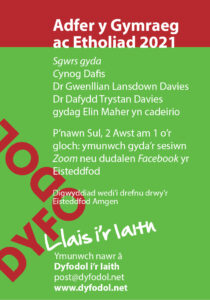We will be discussing our policy document, Planning the Regeneration of the Welsh Language. Sunday August 2 at 1pm
PLANNING THE REGENERATION OF THE WELSH LANGUAGE CONSULTATION DISCUSSION POINT 8: LANGUAGE PLANNING
The latest discussion point of our consultation on Planning the Regeneration of the Welsh Language is the role of LANGUAGE PLANNING.
As before, we would be very grateful to receive your comments, suggestions and any practical experience you may have. You are welcome to use the questions and template below or send your comments in any other format that suits you.
Below is a summary of Dyfodol’s demands in relation to Language Planning. If you would like to read the full text of Planning the Regeneration of the Welsh Language, a copy is available on our website, dyfodol.net
Thank you to everyone who has already contributed to our discussion. We look forward to hearing from you – do get in touch:
or telephone 01248 811798
DISCUSSION POINT 8: LANGUAGE PLANNING
Dyfodol believes that:
If we are to regenerate the language through the process of language planning the priority areas outlined previously need action: disseminating understanding; the early years; statutory, further and higher education; developing the workforce; promoting language use; demography and technology and the media.
Many of the things we have outlined have already been done, creatively, inventively and with excellence and that is why the language finds itself in as strong a position as is the case. However, they have never been developed together in a strategic manner.
Language planning means that action is taken in an integrated, holistic and co-ordinated manner so that all aspects reinforce each other. We need continuity and persistence over an extended period (30 years initially to get to the million). We need consistency, along with experimentation and the flexibility to adapt to new circumstances. The question is, who is going to do all this?
DO YOU AGREE WITH US? HAVE YOU ANY FURTHER COMMENTS ON HOW TO ENSURE INTEGRATED AND HOLISTIC LANGUAGE PLANNING? WHO SHOULD BE RESPONSIBLE FOR THIS?
PLANNING THE REGENERATION OF THE WELSH LANGUAGE CONSULTATION DISCUSSION POINT 7: TECHNOLOGY AND THE MEDIA
The latest discussion point of our consultation on Planning the Regeneration of the Welsh Language is the role of TECHNOLOGY AND THE MEDIA.
As before, we would be very grateful to receive your comments, suggestions and any practical experience you may have. You are welcome to use the questions and template below or send your comments in any other format that suits you.
Below is a summary of Dyfodol’s demands in relation to technology and the media. If you would like to read the full text of Planning the Regeneration of the Welsh Language, a copy is available on our website, dyfodol.net
Thank you to everyone who has already contributed to our discussion. We look forward to hearing from you – do get in touch:
or telephone 01248 811798
DISCUSSION POINT 7: TECHNOLOGY AND THE MEDIA
Dyfodol believes that:
It is plain to see this is where culture, the economy and social interaction are being transformed at an extraordinary rate. It is central to the project.
How to use technology and the media to strengthen the Welsh language and to serve Welsh speakers is too large a question to discuss in detail here. But the main players, S4C and the BBC, need to accept their responsibility not only to provide content, but also to promote the Welsh language in the digital world including the social media. An essential step, which Cymdeithas yr Iaith are campaigning for, is the establishment of a Welsh Ofcom.
DO YOU AGREE WITH US? HAVE YOU ANY FURTHER COMMENTS ON HOW TECHNOLOGY AND THE MEDIA CAN SUPPORT THE GROWTH OF THE WELSH LANGUAGE?

